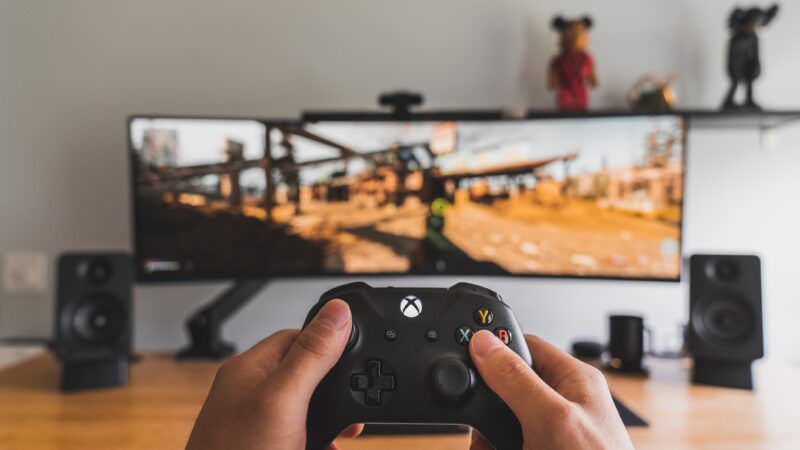Chinese Regulators Tell Kids They Can't Play More Than 3 Hours of Video Games a Week
The government appoints itself the nation's parent.

Beijing has just delivered a blow to the gaming industry, and a blow to Chinese children's freedoms. Starting September 1, minors in China will be allowed to play video games (including those played on mobile devices) only from 8 p.m. to 9 p.m. on Fridays, Saturdays, Sundays, and holidays. So: one hour per day, with a cap of three hours per week.
Former regulations had less restrictive caps, allowing an hour and a half of gaming per day with up to three hours allowed on holidays (for a total of 13.5 hours per week). It's unclear how these new restrictions apply to console gaming, or whether parents could feasibly override these rules by allowing kids to use an adult's gaming account. (Other workarounds, such as VPNs, could also potentially work.)
This applies to online games / platforms, which is technically every game officially released in China, but console platforms fall into a grey category.
Consoles do have parental controls, like the West, but there is no forced limit at this time.
— Daniel Ahmad (@ZhugeEX) August 30, 2021
The regulations—which require that people use their real names to register, instead of using anonymous accounts—state that they aim "to resolutely prevent minors from becoming addicted to video games, and to effectively protect their physical and psychological health." This will allegedly "lead minors to form positive habits in the use of the internet."
"Teenagers are the future of our motherland," said one government spokesperson, according to the state-owned news agency Xinhua. "Protecting the physical and mental health of minors is related to the people's vital interests, and relates to the cultivation of the younger generation in the era of national rejuvenation." (It's no surprise that the Communist Party sees young people not as autonomous individuals but as resources to marshal, to extract from, to serve the interests of the state.)
China's underage gaming force is about 110 million strong, and gaming is a source of joy for many people. Though tech leviathans such as Tencent say their bottom lines won't be terribly threatened by the state's imposition—a little less than 3 percent of the company's gaming-related revenue comes from minors, which is on par with what competitors report—the new rules could still hurt the industry while stripping kids of a hobby many hold dear.
Regulations such as these have been threatened for years, but Beijing's recent crackdown on the tech sector makes now a ripe time to go after gaming companies. State-controlled media have rolled out predictably fawning coverage of the move, calling video games "spiritual opium" in now-retracted comments.
Moral panics about video games seem to cycle around every few years, at home and abroad. But critics routinely sell short the value many kids, teens, and unemployed young men get from gaming.
"I was…a deeply depressed, closeted gay teen at the darkest, cruelest point of the AIDS crisis, terrified that if anybody found out I'd get the crap beaten out of me, and if I ever acted on my urges I'd get sick and die," wrote Reason's Scott Shackford in 2018, when the World Health Organization declared "gaming disorder" a psychological addiction. "It's not difficult to imagine why I might have wanted to distract myself in a candy-colored world of maze-dwelling Pac-people, bug-shaped invading space aliens, and pixelated spy games. I'm not sure if I would have survived my 1980s puberty without video games as an omnipresent distraction."
As Reason's Peter Suderman wrote in 2017, games
don't put food on the table. But they do provide, at least in the short to medium term, a sense of focus and success, structure and direction, skill development and accomplishment. Spend any time reading video game reviews, and you'll find that two of the most common terms of praise are that a game made the reviewer 'feel powerful' and that it provided a 'sense of achievement.' Games, with their endless task lists and character-leveling systems, their choice architectures and mission checklists, are purpose generators. They bring order to gamers' lives.
Even the most open-ended games tend to offer a sense of progress and direction, completion and commitment. In other words, they make people happy—or at least happier, serving as a buffer between the player and despair. Video games, you might say, offer a sort of universal basic income for the soul.
It's wrong whenever anyone attempts to restrict what people do to themselves without harming others; it's worse still when the authorities remove parental autonomy over household decisions, all while trying to chasten and deflate tech companies the Chinese Communist Party perceives as having grown too independently powerful. But video games are an easy scapegoat for all manner of social ills, whether you're a public health official, a concerned op-ed writer, or the government of China.


Show Comments (49)